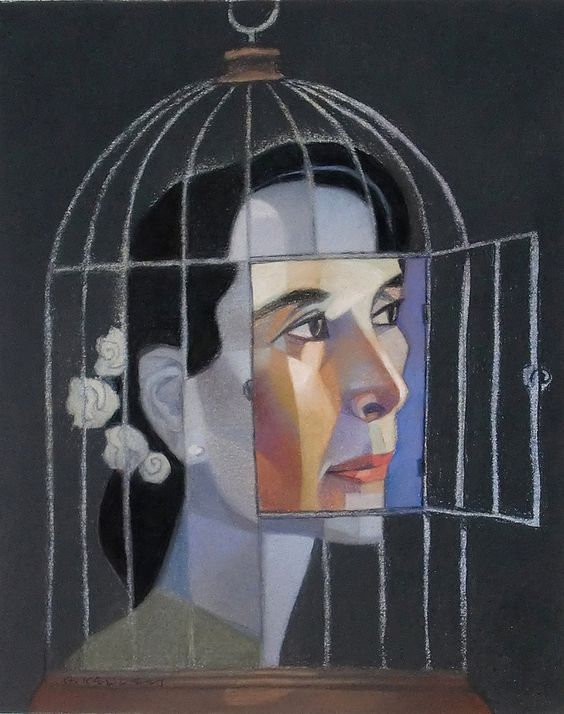
I’ve been writing Ramshackle Glam for nearly ten whole years – which means that there is a LOT of good stuff hanging out in my archives. So each Friday, we’ll be doing a little throwback to one of my personal favorites. This week’s is a searing three-part post on a marriage torn apart by faith and politics – you may recall that it was originally written anonymously by a woman named “EB.” In the years since she wrote these words, EB has published a memoir on the topic, and has given me permission to post her story here.
Lyz Lenz is the author of God Land: A Story of Faith, Loss, and Renewal in Middle America. She is also one of my personal heroes.
PART ONE: THROW PILLOWS FOR THE CAGE
Thousands of silent pains make up the life of every woman. The quiet indignities of cleaning up that sock again in the dark before bed. Washing dishes alone in the kitchen, while laughter filters in through the other room. Crying with the baby in the middle of the night. The monthly cramps that punch you so hard you swallow vomit. Your lips aching while you say again, “Oh, he just had to work today” when you really want to scream “That asshole is taking another nap and refuses to come to kids birthday parties.” The boss who always looks at your breasts instead of your eyes. The family friend who likes to tell you about all the sex he has, while his mouth is full of spit and yours is so dry. Knowing exactly how to hide puffy eyes with just the right amount of cold compresses and makeup. Or hide them enough so that the men never notice and the women know to look away.
Three weeks ago, I decided I wanted a divorce.
I’ve been married for over 12 years. We have two kids. I never wanted this. When the cracks first began to appear, I figured I could fix most of them and live through the rest. I read about women who had famously fraught marriages—Eleanor Roosevelt, Shirley Jackson, Mary Shelly. I could be like them. There is a certain glamour, after all, in bucking up—in carrying your head high and soldering through. That’s American, after all. The women who sigh, heft the baby to their hip, found a company, run a campaign, “in spite of” not “because of.”
In the concept of love that I had been taught as a child, one celebrates longevity over happiness. God cares more about character than comfort, I was told. The lesson is found in enduring a trial, not in finding your way out of it: A lesson in giving and giving, and expecting nothing in return. We laud the martyrdom of our women. The higher your cross, the more ornate your Mother’s Day card. “My mother gave me everything and did nothing for herself,” grown men say, as if that is an accomplishment to celebrate rather than a tragedy to mourn.
But freedom is harder to come by than simply redecorating your cage. So we went to therapy. I signed up for a lingerie of the month club and scheduled a babysitter for regular nights out. We needed to connect again, that was all. If only we could connect, he wouldn’t tell me again that my career was a waste, or that I was valuing it above him. If only we could be intimate, maybe he’d feel energized enough to relieve me of the laundry, the cleaning, the next appointment that needs to be made. Maybe we could take cooking classes? Do a puzzle together? A vacation should solve it. A scented candle. Saying “I love you” just a little more. A thousand little things that never worked.
—
The day I decided to divorce my husband was the day I discovered he’d hidden my sign again. I’d bought a wooden sign from the Target dollar spot that read, “Drink up, witches!” and I thought it was funny in that basic, wine mom kind of a way. It cost three dollars. I brought it home and set it up on the hutch.
Soon the sign disappeared. I found it hidden on the top shelf of the hutch. I set it back up. It disappeared. Over and over again, until I finally snapped. “Stop hiding my things!” I screamed.
It wasn’t just the sign. Previously, he’d hidden other things: my shirts, one with “Nevertheless She Persisted” written across it, others just button-ups that he didn’t like. A mug that read, “this could be whiskey.” I found them all in hidden caches of the basement.
You can’t hide who I am, I’d told him. I’m not, he said. I just find your stuff offensive, he said. I’ve been doing this for years, he said.
That was the day I moved out of our room into the guest room. I was still certain we were going to work this out. What was a thousand tiny little pains in the face of a long life? At what point does a marriage tip over from normally broken into permanently damaged? I held on, not sure whether we’d hit our own, personal tipping point yet. We did more counseling. But then I bought home a sign that said, “Drink up, witches,” and it disappeared. And that was it. That was the moment.
A friend of mine told me that her moment came when her husband complained about the omelette she’d made for him one Saturday morning. “Feta?” he’d said, sneering, still rubbing sleep from his eyes. She’d been up since five in the morning, getting things done around the house. She slammed the whole meal into the trash, and left the next week.
A thousand little pains. A million little cuts. Fucking done. Sorry Eleanor, sorry Shirley, sorry Mary. This isn’t about comfort. My character is fine. And no amount of redecorating can make this cage I’ve been living in bearable.
PART TWO: CRICKET
We aren’t a couple who yells. We keep all of our dysfunction hidden behind wide smiles (me) and silences (him).
Several years ago, we had a fight before friends came over for dinner. I had asked him to vacuum while I cooked. He didn’t because he said I was too crazy about cleanliness. I was shaking when I opened the door. Yelling too loudly how happy I was to see everyone. Too quickly pouring the wine.
When we first got married, twelve years ago, I loved his silences. My own family is volatile. My childhood is marked by roars of full-throated anger. I’ve seen my dad punch walls and my mom break glass. Silence was what I wanted. It seemed safer to me.
My first Thanksgiving with his family, I brought my brother, who is also my best friend. When the table was cleared from dinner, we giggled as everyone politely licked their forks and kept them in their hands, waiting for dessert.
“Do they not make any more forks?” My brother asked.
No one responded. Maybe one of the aunts smiled.
As we stood in the doorway, putting on our boots to leave, everyone stood around us. No one said a word. I cleared my throat.
“Cricket,” my brother said. “Cricket. Cricket.”
I choked. No one said anything. “Thanks for dinner,” I said, and ran out the door. My brother behind me, still saying “CRICKET!”
I laughed so hard I peed myself a little.
The silence was quaint. A new language I was all too happy to learn. Whenever I did yell, he’d frown. “You’re being crazy,” he’d say. “You are being too crazy.”
When our second baby was born, I was so tired I couldn’t not yell. I needed help, and I needed someone to hear me.
“Can you get medicine for that?” he would ask me when I called him, begging him to come home early from work so I could nap.
Silence can be a harbor. But silence is also a weapon. Things unsaid – but felt and believed – can still hold destructive power. Silence can squeeze and squeeze a person until they drown beneath its waves. For so many years, I never touched the silences. I think I must have known what I’d discover if I forced him to talk about the frowns, give voice to the constant turning away.
But last year, tired and overworked, frustrated by the silences that for three years I’d been trying to exorcise with therapy and countless couples date nights, I began to demand answers. Why hadn’t he read the books I’d written?
And this: Why did the fact that I’d achieved one of my lifelong dreams make him so unhappy?
Don’t push a silence, because it pushes back. The answers: He thinks my writing is immoral and wants me to quit my book projects. He thinks I have a string of mental illnesses that stem from my writing. Maybe I should get a medicine for that, he suggests. I’m not against medicine, but every doctor tells me I’m fine. He suggests they aren’t qualified because they are women.
I pushed on other silences, too, and discovered bitter resentments in every corner. But now that they were in the light, I wanted to air them out.
Let’s talk about them, I’d push. Let’s make this right again. But every time, learning what he had kept in silence hurt, and then hurt again. Nothing ever healed. Every talk was another chance for me to learn how I’d failed. My hair, my clothes, my mugs. The sound of my voice.
So now we sit in silence, just waiting it out until I can find a place and go.
A few days ago, he came to the room where I sleep now and asked to talk. He wanted to do all the conversational exercises I’d forced him to do years ago so we wouldn’t end up in this place. But this time, it was my turn to retreat into silence. I couldn’t take another truth. Not one more revelation.
When I do finally pack up, my brother says he will come help me. He promises to yell, “CRICKET, CRICKET” into every corner of the house.
PART THREE: BREAKING
After I left my husband, ending our 12-year marriage, people asked me: What changed? Why now?
Everyone has to come up with their own narrative of the end—some way to make the entire collapse of your life make sense. Right now, my husband’s narrative is that I’m living with a non-specific thyroid disorder, which turned me crazy. And my narrative is this: I just got tired.
I didn’t date much in high school. I was loud. Too thin. I had braces. The boy behind me in biology kicked the back of my legs every time I raised my hand in class. The one boy I had a crush on came out to me. The other boys dated the prettier girls. I met James in high school. We both had the same after school job at a fast food chain. He gave me rides home. Offered to pick me up for work. And asked me to homecoming.
We went to separate colleges, but he was there still. Sending me emails, chatting over AIM. I dated two other people, and eventually, one summer, began dating James. He took me on a date to go look at a meteor shower. He barely said a word the whole night, but I felt loved. A year later, he proposed to me by driving me to the place where we had our first kiss and playing one of my favorite songs through the speaker of his car.
We danced under the stars. I said yes, because we’d have a good life. I’d be loved. What more did I need?
But the things that eventually broke me were always there, all along. He had been hiding my things, the stuff he didn’t like: Straw hats, t-shirts, mugs that had feminist slogans. Sometimes I thought I lost them. Other times I knew he took them. And then after we were married, there was the money, calling me every day to want to know why I spent $10 at CVS, or to tell me we couldn’t afford to buy pizza, so no date night. He didn’t seem interested in my writing, often rolling his eyes when I told him about a rejection, or about a story I was in. But relationships are often transactional. We give up in order to gain.
My own parents have a tumultuous relationship. They fight. They separate. They return. It’s a rollercoaster of passion and mental illness and so many other things I won’t even pretend to understand. All I knew is that I didn’t want that. So James it was.
He was a good man. He was solid. He was a good provider. The day before my wedding my mom told me I didn’t have to do it; I didn’t have to marry him. I was angry when she said that and I wondered why. I knew I didn’t feel passion for him, I knew that he was often severe—once rolling down the car windows in 15 degrees and leaving them down for several miles because he hated the music I was playing—but our life, I believed wouldn’t be ruled by the constant tumult that had guided my childhood.
I didn’t realize how truly radical it is to ask someone to love you. All of you. And maybe that’s what James and I both did—failed to see one another, all of each other, until it was too late.
—
There was a fight we had when I was pregnant with my second. I’d been working on a project that featured a prominent gay rights activist. “You are advancing the homosexual agenda,” he told me one night after I’d asked him why he’d been so cold the last few days.
“Don’t be stupid!” I yelled. “Don’t say ignorant shit like that!”
We never got anywhere on the fight. Eventually I slept in the guest room sobbing so hard I thought I would send myself into labor. I cried not only because his words were deeply offensive, but because I’d been forced to see something I would have rather ignored—his coldness, his righteousness.
Part of me knew he’d always believed things like that, and simply never articulated them. Not to me. And why would I kick the foundation that my entire life rested on? He’s a good man. A good man, I told myself. Other people told me, too. So I didn’t leave. Plus he apologized; he was sorry for saying that. I believed it because I needed to, and we continued on.
Of course, in hindsight, it’s easy to say that was an obvious moment of disconnect. But our lives aren’t lived in reverse. They are lived in these messy moments of runny mascara, pregnant bellies, and us just trying to make spaces where we are loved for all of who we are.
We tried to fix it. Lingerie of the month club. Puzzles. Date nights. No vacations though, because he didn’t want to leave the kids. I scheduled in time to watch “Star Trek” every week with him. I missed assignments and deadlines, because I didn’t want to make him mad by overworking.
It didn’t work. And now I have a whole space in my head full of memories that I go through one by one, trying to reconcile the past with where we are now. Some of them take on a new hue. The time he refused to play cards with me by dramatically slapping his wedding ring on the table. A story he told often, to demonstrate how competitive he is. That one feels menacing.
But what about our proposal? My favorite song by James Taylor. What about him driving six hours to come see me the day I received news of a family member’s death? What about how much I love his grandmother? The times I laughed with his sister so hard we cried? Him driving me home in high school, never once making fun of me for not having a car?
I refuse to throw those memories away in favor of an easy narrative. So I hold them for now, honoring their beauty, while also finding solace in the fact that I’m finally out – and in a place where I am loved fully. In this house, alone.
Lyz Lenz’s memoir, God Land: A Story of Faith, Loss and Renewal in Middle America, is available wherever books are sold.






